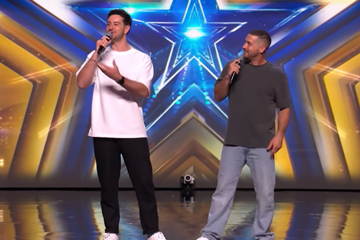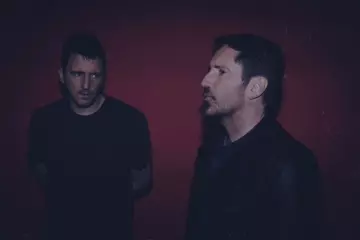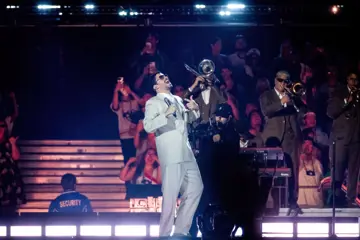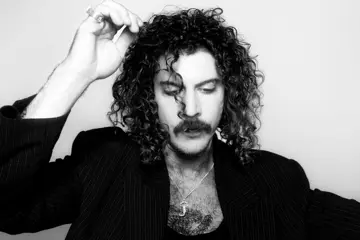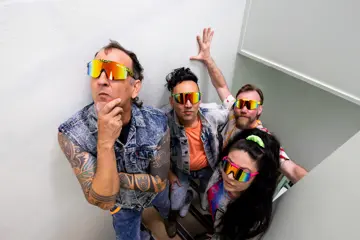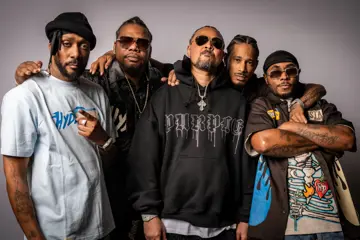Boxing Day, 2004 – a tsunami rising from the Indian Ocean tsunami slams Indonesia and kills roughly 230,000 people. One of those lost was holidaying Nasum vocalist and guitarist Mieszko Talarczyk, aged 30. His band had been on a warpath of creative destruction since their formation in 1992, having released four highly-praised albums through Relapse Records in addition to dozens of EPs, splits and compilation appearances. The beast was suddenly stopped in its tracks and had no intention to ever replace Talarczyk or perform again.
Drummer Anders Jakobson formed death metal group Coldworker, guitarist Jon Lindqvist got his crust on in Victims, guitarist Urban Skytt continued to shred in goregrinders Regurgitate, and Liveröd threw his energy into one final album from his progressive metal group Burst. Nasum released Grind Finale in 2006 – a compilation of rare and unreleased material, as well as a retrospective book on the band – and the world was told that was to be the final chapter of their legacy.
Then in October 2011 the announcement came that Nasum would be reforming for one final tour – a tour that included them saying goodbye to places familiarised by the band, and giving continents that had never seen the group, such as Australia, a chance to experience their songs live.
“It has been lurking back there,” comments Liveröd, who joined the band in 1999, on the urge to end things right. “We don't live in the same cities. One would mention it now and then but not really take it seriously for a few years. Anders has been thinking about it the most out of us, and I think in 2010 he came up to see us in Stockholm, and had dinner and a few beers, and talked about Nasum, talked about Mieszko, talked about everything, and he suggested that we do something to acknowledge both the band as it is, and the 20th anniversary, and to give the band a proper farewell. Everything was very abrupt obviously when Mieszko died. We wanted to end the band the way it was supposed to be, not the way we were forced.”
Keijo Niinimaa – vocalist for fellow Swedish grinders Rotten Sound – was selected to carry forth the vocal front for the group.
Don't miss a beat with our FREE daily newsletter
“Obviously it was important that if we were going to do this thing, it needs to be as good as possible, with a very competent singer who can really deliver. It was also obviously very important to us that whoever does this has a clear connection to the band, that we know, and that there was a connection also with Mieszko. We didn't want anybody to be the new singer of Nasum – this is a guest that is supposed to have some sort of relation to us. All things considered, Keijo pretty soon stood out as more or less the only candidate that we could ever think of. We have history with his band Rotten Sound – we have toured with them, they recorded with Mieszko when he was still alive, we all stayed in touch with him, and to top it off he is a great singer and a great performer too.”
And how did Niinimaa handle the massive torch he was selected to carry?
“He was nervous, man. He was a really big fan of the band as well. He was a Nasum fanboy basically. He was very nervous and took it very seriously. Keijo is a very professional guy and he has been rehearsing like crazy for the last year-and-a-half. Even when we haven't met up he's been rehearsing on his own, going jogging and singing the lyrics, all kinds of weird stuff.
“[There's been] one or two internet detractors, but apart from that it has been surprisingly above that,” he says on whether or not the decision to reform with a guest member was met with any negative backlash. “We've been surprised at how well this thing has been received. It's such a sensitive thing when someone dies, when someone is such an integral part of a band, the position of Mieszko was sanctified. We really had to think about what we're doing and how we're doing it.
“I think that people have the same perception as us – that Nasum wasn't only one person, Nasum was a band, with several individuals, and the band itself was not only Mieszko. This is not so much a tip of the hat to our old singer, but a tip of the hat to a band that meant a lot to us, and to a lot of fans. I guess the lack of critique from people, I would have expected a bit more. It has been super positive for us, and people have been really understanding that this is a one off for us, and that we aren't capitalizing off Mieszko's death. We are blasting, grinding, having a good time, getting over the grief and just doing what we were supposed to, and going out the way we were supposed to, and not ending it like how it suddenly happened a few years ago. People appreciate the way it is and see it the way we do.”
Having played their first show back in the band's hometown of Orebro, Sweden, Liverod determines that the experience was “liberating”. The show was attended by “a lot of friends from the past, all of Mieszko's friends, and all of everyone involved with that city's music was basically there. The nerves were pretty on the outside for us, but going out there and just blasting away, every sense of nervousness just flew out with the blasts.”
The schedules lined up, and Tasmania's technical death metal legends Psycroptic were selected to support the group on their Australian tour, much to the chagrin of internet-warring grindcore purists. So how then does Liverod feel on the issue of mixing it up?
“Grindcore is still important to me, and I love grindcore as much as I ever did I think, but you know, for us as well as for the others, we appreciate mixed bills... whether it's metal, hardcore or punk. I was always irritated at that purist way of looking at this genre. Grindcore to me is all a part of the same music scene, and I don't see why variation is a problem to people. When you tour and there's five grindcore bands opening up for you every day, it tires us a bit, and I'm going to say that I think the audiences would get a bit overwhelmed by five grindcore bands then us. Nothing would really stand out, and it kind of flows into a big mould of grind. I can appreciate that, but I also appreciate variation a bit. I really hope that people can pick the gems from the different types of music styles that are going to be represented on this tour, and just go above and beyond the limitations of just one genre.”



